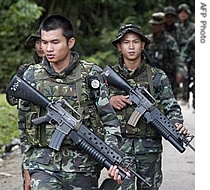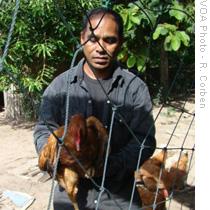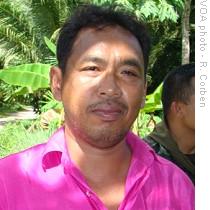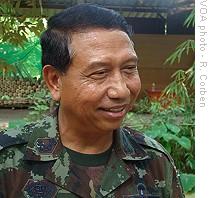Baan Sa-e, Thailand
25 August 2009
 |
| Thai soldiers carry their weapons as they patrol down a street in Thailand's restive southern Narathiwat province (2007 file photo) |
In the village of Baan Sa-e in Thailand's troubled Yala province, children display local products and food created in projects encouraging economic self-sufficiency.
The projects, backed by the military's Internal Security Operation Command (ISOC), are designed to raise crop yields for farmers.
Colonel Attadet Mattanom, a spokesman for the ISOC in southern Thailand, hopes the region's sectarian violence will ease if the economy improves.
"In this area we try to look after the local people here which are the majority of the population," he said. "They have a sufficient way of living - we try to make it more complete. If they have sufficient [means] to live and they live according to their religion then they think they are happy enough."
Thailand's southern border provinces of Yala, Narathiwat, Pattani and Songkhla, are among the nation's poorest. The residents are predominantly ethnic Malay Muslims; overall, about 95 percent of Thais are Buddhists.
Since 2004, the region has been wracked with violence, as the army battles an Islamist insurgency. More than 3,500 people have died, mostly civilians.
The government has spent more than $3 billion to build up the economy and provide security in the south.
 |
| Yala Army Village Training Center, Southern Thailand |
The army says more than 7,000 families have already benefited from the program.
The center also offers a drug rehabilitation program that has treated more than 10,000 youth. Authorities say most villages in the south face problems with drug abuse, especially methamphetamines.
Winning "hearts and minds"
Such programs are central to the government's goal of winning "hearts and minds" in the region.
In the village Baan Mae Tinah in Pattani province a furniture factory is working at full capacity. It employs 20 men in a village that is home to a mix of Muslims and Buddhists.
 |
| Baan Mae Tinah Village Headman Nai Prayon Pumgow |
"I would like them to give the moral support so that they continue to live and fight," he said. "But in this area, there is peace. Here we live in peaceful coexistence. I would like to give my message to the Thais in other areas for them to live together in peace."
The Thai military points to this village as an example of its success in securing local support.
Professor Surachart Bamrungsuk is a political scientist from Chulalongkorn University in Bangkok. He says the new strategy helps build community confidence and also provides intelligence about the Islamist insurgents.
"For me it would be better if we accept that counter-insurgency needs to win at the people level not at the military level - so the concept of winning the hearts and minds would be applicable to the Thai army," he said. "Then it becomes something new. That's why at this time the military has to adjust to a new kind of war."
The army, however, is tainted by accusations of human rights abuses. Few cases have been fully investigated and scores of deaths remain unexplained.
The Appeals Court recently rebuffed efforts to identify those responsible for the deaths of more than 70 men in 2004 in army detention. The court ruled that security officials are protected from prosecution because the government has imposed emergency laws in the south.
Surachart says admitting its mistakes is difficult for the army.
"This is a problem because when we talk about the mistakes in the past they feel that they would like to move further into the future," he said. "That is to say, try to go away from what has happened in the past. But as you know sometimes it's not easy."
The insurgent violence goes on almost unabated, despite improved security in some areas.
But the army thinks it is on the right path. Colonel Kicha Srithongkul, is a deputy general commander of Songkhla Combined Task Force.
 |
| Colonel Kicha Srithongkul, Songkhla Combined Task Force |
Control over the southern border provinces has largely been in the hands of the army since emergency powers came into effect in 2004.
The army says such powers give it the flexibility needed to administer the region. There is considerable opposition, however, among rights groups and community leaders in the south, who think it would be better if civilians administered the troubled region.